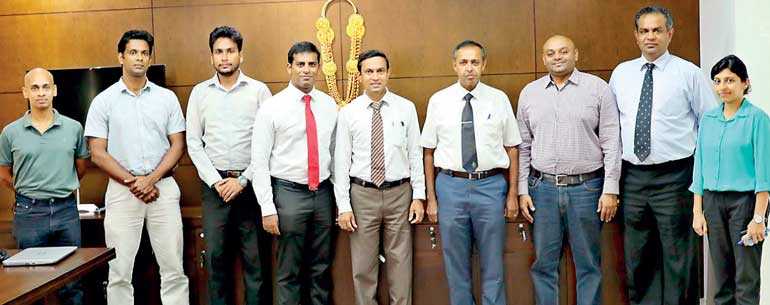Friday Feb 27, 2026
Friday Feb 27, 2026
Monday, 14 October 2019 00:00 - - {{hitsCtrl.values.hits}}

From left: Archt. Kolitha Perera, Dr. Charith Chitraranjan, Chanaka Vithanage, Talal Rafi, Prof Rohan Munasinghe, Vice Chancellor Prof. Kapila Perera, Fayaz Hudah, Dr. Prasad Samarasinghe and Amali Hettige
The University of Moratuwa is shifting gears in innovation and commercialisation through the University Business Linkage Center (UBLC).
With the guidance of the Vice Chancellor Prof. Kapila Perera, UBLC is presently directed by Prof. Rohan Munasinghe.
UBLC was initiated with a University Grants Commission Circular and is funded by the World Bank for a few years through the AHEAD (Accelerating Higher Education Expansion and Development) project.
The UBLC Operations Committee (photo) will look to help commercialise projects that have been evaluated to have a potential for commercialisation. The projects that are selected to be commercially viable will be given incubator facilities to run their business startups for a few years. The centre has a Patent and Technology Transfer Office (PTTO) and a Startup Incubator.
PTTO will help with patenting and licensing of innovations, for which a leading law firm of Sri Lanka has already pledged their support. The startup incubator will foster startups by providing various supports startups need such as secretarial, taxation, market research, business modelling, human resource management, and audit services. This way, it is expected to elevate the success rate of local startup companies.
The industry experts Dr. Prasad Samarasinghe (Managing Director – Lanka Bell), Fayaz Hudah (Co-founder – Spiralation) and Talal Rafi (Entrepreneurship Specialist – USAID Project YouLead) provide the Operations Committee the insights from the perspective of the industry. UBLC is in fact an all-in-one ecosystem for commercialisation of research outcomes. As expected, UBLC will start delivering high value patents and innovative products out of the university on regular basis which will then lead to establish high-tech companies and employment opportunities. The innovation commercialisation process once integrated to the system will have a lasting effect on wealth creation and national development.